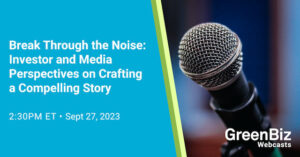
According to the International Labor Organization (ILO), 24 million new "green jobs" will be created globally by 2030. Finding and training the people to fill those jobs is a multipronged task that involves recruiting and engaging a new pipeline of talent. The Biden administration’s American Climate Corps and Green Skills Passport, a free program from EY and Microsoft, are two examples of programs designed to engage younger people, providing them with training to develop sustainability skills. And earning a bachelor’s degree in sustainability is possible at 421 U.S. colleges, which also helps build a pipeline.
But multiple reports, including Microsoft’s Closing the Sustainability Skills Gap: Helping businesses move from pledges to progress and LinkedIn’s Global Green Skills Report 2023, indicate focusing on youth alone will not address the need for the nearly 4,000 corporations that have committed to be net zero by 2030.
Chris Boone, a professor at the School of Sustainability at Arizona State University, said, "We're not graduating enough students in sustainability to meet the demand. We need to provide alternative pathways for people who may not have the time, resources or inclination to spend two or four years going through a regular degree program. That’s where executive education comes in: How can we change the mindsets of people who are already in these positions or moving into these positions?"
Making the investment
An increasing number of companies are recognizing that investing in sustainability education for employees, leaders, suppliers and boards is critical to achieving aggressive climate and social goals. One of the key findings in Microsoft’s report, for example, is that "virtually all workers will need basic sustainability fluency." And LinkedIn‘s research shows that between February 2022 and February 2023, its job postings requiring at least one green skill grew by a median of 15.2 percent. Investing in sustainability education will help everyone "own" sustainability at a corporation, increasing the potential for success.
An early example of a corporation educating and engaging employees comes from Walmart’s "My Sustainability Plan" (MSP) a decade ago in which employees were asked to make a single change to reflect the company’s goals — ride a bike to work, volunteer, clean a beach. The ripple effect was palpable: Walmart employees began taking more ownership of sustainability within the stores and their communities.
Today’s approach, however, is increasingly more formal. Author Andrew Winston, for example, has partnered with BCG to help develop The Climate & Sustainability Accelerator, an executive education class powered by BCG U that is "designed to cover business essentials in climate & sustainability, equipping leaders and change-makers with the know-how to take advantage of this rapidly changing world." Specific to the highest levels of an organization, Helle Bank Jorgensen runs Competent Boards, which offers courses on ESG, biodiversity and climate. And for people with no sustainability experience who want to get in on the action, a program such as Grow with Google offers an online training.
How to get started
Here are four steps to jump-start sustainability training for corporate boards, leaders and employees:
1. Identify and prioritize your audiences. Yes, ultimately you want to provide education for all employees and key stakeholders, but who comes first? You can determine this based on where the bulk of knowledge lies today. If your executives are already engaged, perhaps investing in the board of directors will provide the most return.
2. Identify needed skills. For corporate leaders, according to Microsoft’s study, the most critical sustainability skills include data collection and management, carbon accounting and reporting, climate change fundamentals and broad stakeholder management. A board of directors needs to be fluent in all things ESG, with an emphasis on governance, as well as the financial risks associated with sustainability. An engineering firm, however, may require more technical skills, such as solar installation, to fulfill its pipeline of green collar jobs.
3. Clarify internal and external resources. With the target audience in mind and the gaps in knowledge or skills identified, you can then focus on the available resources, be it BCG U or another pre-packed program, or developing your own program, as companies including Gap and McDonald’s have done.
4. Be cognizant that this is a journey. Remember that education is an ongoing process. The issues will continue to evolve, so it will be important to establish a continuous cycle of learning for all your audiences. One way to maximize this investment is for the students to become the teachers over time, so consider integrating a "train the trainers" approach into your curriculum.
Sustainability is here to stay and as the field becomes more regulated, more sophisticated and more strategic to the success of a business, education at all levels will be needed to ensure skills and knowledge keep up.
- SEO Powered Content & PR Distribution. Get Amplified Today.
- PlatoData.Network Vertical Generative Ai. Empower Yourself. Access Here.
- PlatoAiStream. Web3 Intelligence. Knowledge Amplified. Access Here.
- PlatoESG. Carbon, CleanTech, Energy, Environment, Solar, Waste Management. Access Here.
- PlatoHealth. Biotech and Clinical Trials Intelligence. Access Here.
- Source: https://www.greenbiz.com/article/how-invest-sustainability-education-corporate-boards-execs-and-employees
- :has
- :is
- :not
- :where
- $UP
- 000
- 15%
- 2022
- 2023
- 2030
- 24
- a
- accelerator
- According
- Accounting
- achieving
- Action
- address
- ADvantage
- aggressive
- ago
- All
- alone
- already
- also
- alternative
- an
- and
- Andrew
- Another
- approach
- ARE
- arizona
- Arizona State University
- AS
- associated
- At
- audience
- audiences
- author
- available
- Bank
- based
- basic
- BCG
- BE
- Beach
- become
- becomes
- began
- between
- biden
- board
- board of directors
- broad
- build
- business
- businesses
- but
- by
- CAN
- carbon
- change
- changing
- class
- clean
- Climate
- Climate change
- Cms
- cognizant
- collection
- Colleges
- comes
- committed
- Communities
- Companies
- Company’s
- Consider
- continue
- continuous
- Corporate
- CORPORATION
- Corporations
- courses
- cover
- created
- critical
- Curriculum
- cycle
- data
- decade
- Degree
- Demand
- designed
- Determine
- develop
- developing
- Directors
- done
- Early
- Earning
- educating
- Education
- effect
- emphasis
- employees
- engage
- engaged
- engaging
- Engineering
- enough
- ensure
- ESG
- essentials
- establish
- Ether (ETH)
- everyone
- evolve
- example
- examples
- Execs
- executive
- executives
- experience
- external
- EY
- February
- field
- fill
- financial
- finding
- findings
- Firm
- First
- Focus
- focusing
- For
- formal
- four
- Free
- from
- Fulfill
- Fundamentals
- gap
- gaps
- get
- Globally
- Goals
- going
- governance
- Green
- grew
- Have
- help
- helping
- helps
- here
- highest
- How
- How To
- However
- HTTPS
- identified
- identify
- if
- important
- in
- include
- Including
- increasing
- increasingly
- indicate
- installation
- Integrating
- internal
- International
- into
- Invest
- investing
- investment
- involves
- issues
- IT
- ITS
- Job
- Jobs
- journey
- jpg
- Keep
- Key
- knowledge
- labor
- leaders
- learning
- least
- levels
- lies
- make
- management
- Maximize
- May..
- Meet
- Microsoft
- million
- mind
- more
- most
- move
- moving
- multiple
- my
- nearly
- Need
- needed
- needs
- net
- New
- no
- number
- of
- Offers
- on
- ONE
- ongoing
- online
- or
- organization
- over
- own
- ownership
- palpable
- partnered
- pathways
- People
- percent
- perhaps
- pipeline
- plan
- plato
- Plato Data Intelligence
- PlatoData
- positions
- possible
- potential
- powered
- Prioritize
- process
- Professor
- Program
- Programs
- provide
- providing
- rapidly
- RE
- recognizing
- recruiting
- reflect
- regular
- regulated
- remember
- report
- Reporting
- Reports
- require
- research
- Resources
- return
- Ride
- Ripple
- risks
- rt
- runs
- s
- Said
- School
- Shows
- single
- skill
- skills
- skills gap
- So
- Social
- solar
- sophisticated
- specific
- spend
- stakeholder
- stakeholders
- State
- stay
- Steps
- stores
- Strategic
- Students
- Study
- success
- such
- suppliers
- Sustainability
- Take
- taking
- Talent
- Target
- Task
- teachers
- Technical
- technical skills
- that
- The
- their
- Them
- then
- These
- things
- this
- those
- Through
- time
- to
- today
- Train
- Training
- two
- u.s.
- Ultimately
- university
- virtually
- volunteer
- Walmart
- want
- was
- Way..
- we
- WELL
- were
- which
- WHO
- will
- with
- within
- Work
- workers
- world
- years
- yes
- you
- Younger
- Your
- youth
- zephyrnet
- zero







